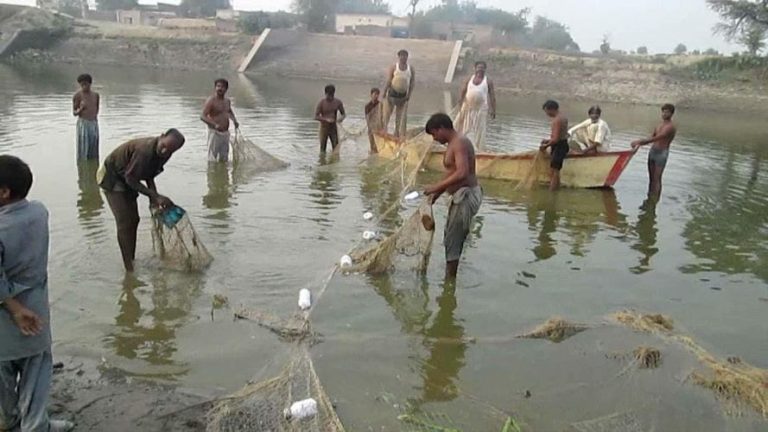
Overfishing has drastically reduced fish stocks and biodiversity
Prof Dr. Abdullah G Arijo
Earning for life is a creativity that may boost you up from earth to the skies. All you need is to make a will and roam around the idea of becoming a tycoon. I am a professor who mainly relies on earning from my university job, but then I sit around making my utility by teaching academies and today, I am comfortable with my earnings.
In Pakistan, the future of fisheries beckons significant potential. Currently, the industry is evolving remarkably as modern technologies enter the scene. Invasive fish species, increasing water pollution, and overfishing are key challenges, but the technological advancements, such as aquaculture systems, offer solutions towards sustainable growth. Inclusive supply chain models are encouraging local fisherfolk, and efforts are underway to curb illegal fishing. Climate-smart fishing practices will help to tackle climate change implications, preserving marine ecosystems. With the implementation of marine-friendly policies, capacity building, and fresher investment in preserving aquatic resources, Pakistan’s fishery sector can propel towards a brighter, more productive future.
People of Sindh must pay serious attention and establish a fishponds, which is a one-time investment and lifelong earning
Pakistan’s fisheries industry, enriched by diverse aquatic fauna, holds promising potential for national economic growth. The future of fisheries in Pakistan could be radiant, buttressed by technological advancements such as streamlined supply chains and improved preservation methods. Integration of sustainable practices is paramount to preserve marine biodiversity and maintain a balance in aquatic ecosystems. Government initiatives are required to address overfishing, illegal practices, and environmental concerns, ultimately leading to an efficient, sustainable fisheries industry. Furthermore, capacity development programs could empower fisher folks with advanced fishing methodologies and entrepreneurship skills. The future heralds an era of a sustainable and technologically driven fisheries industry, significantly augmenting Pakistan’s national economy.
With an increasing global demand for seafood and growing concerns about overfishing sustainable fish farming could become a key industry for economic growth and food security. Aquaculture could contribute to poverty reduction by providing employment opportunities to the abundant rural population. Hybrid fisheries and improvement in hatchery operations could enhance production capabilities. Government support, technological advancements, and foreign investment could further drive this sector. However, for the future of fisheries in Pakistan, challenges like lack of infrastructure, environmental concerns, and inadequate research need addressing. To tap into the full potential, there is an urgent need for capacity building, the adoption of modern farming techniques, and the integration of the aquaculture value chain. The future fisheries landscape in Pakistan could be vibrant and productive, given the right interventions and implementation strategies.
The government should also provide loan for establishing fishponds
Aquaculture in Pakistan presents an optimistic prospectus with the future of fisheries poised for significant growth and transformation. Its strategic location, inviting maritime climate and rich biodiversity provide ample opportunities for sustainable aqua-farming. Current trends suggest a promising shift towards fish farming, improving fish species diversity, and enhanced production techniques. Prospects include not only increased local consumption but also elevated Pakistan’s status in export markets. Challenges such as improving fish health management, enhancing the quality of produce, and establishing effective marketing networks remain. However, government initiatives aim to overcome these obstacles, instilling hope for a vibrant aquaculture industry. This sector holds great potential to contribute vastly towards the national economy, food security, and employment generation.
The fish industry in Pakistan faces several challenges that may jeopardize its future. Overfishing has drastically reduced fish stocks and biodiversity. The lack of modern fishing technologies and poor management practices further contribute to the unsustainable exploitation of marine resources. Additionally, water pollution due to industrial waste not only affects fish health but also makes the aquatic environment uninhabitable. Limited access to international markets and inconsistent implementation of seafood quality standards further hamper industry growth. Lastly, the impact of climate change, such as rising sea levels and temperature, threatens marine life and could lead to significant changes in fish distribution and availability. Addressing these issues is critical for the sustainable future of the fish industry in Pakistan.
People of Sindh must pay serious attention and establish a fishponds, which is a one-time investment and lifelong earning. The government should also provide loan for this activity. All you need is to make a will and go ahead.
________________
 Prof. (R) Dr. Abdullah G. Arijo is Advisor and Visiting Professor, SBBUVAS, Sakrand, Pakistan. He is Ex-Chairman, Department of Parasitology, Sindh Agriculture University and Ex-Advisor Academics & P&D to Vice Chancellor SAU Tandojam
Prof. (R) Dr. Abdullah G. Arijo is Advisor and Visiting Professor, SBBUVAS, Sakrand, Pakistan. He is Ex-Chairman, Department of Parasitology, Sindh Agriculture University and Ex-Advisor Academics & P&D to Vice Chancellor SAU Tandojam
[…] Also read: FUTURE OF FISHERIES IN PAKISTAN […]